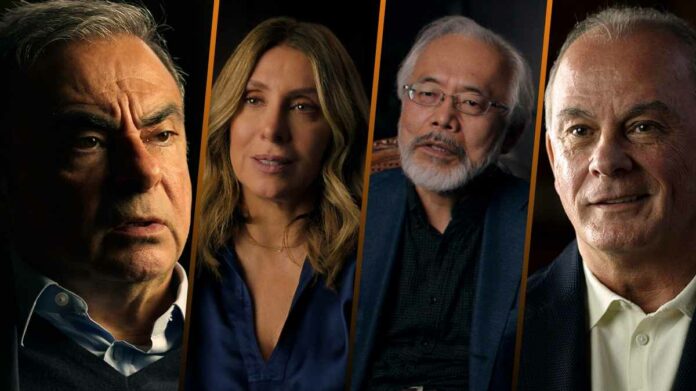The fundamental thing about documentary filmmaking is telling a story in a manner that is exciting enough to grab the attention of the audience. Otherwise, why would you watch something about which you can find basically everything on the internet itself? Apple TV’s latest documentary series about former Nissan and Renault CEO Carlos Ghosn, titled Wanted: The Escape of Carlos Ghosn, follows this fundamental thing to a tee. As a result, watching the four-episode docuseries feels like watching a big-budget Hollywood thriller. The story itself is something that any filmmaker would grab to make cinema out of it. Someone like Michael Mann or Ben Affleck would do proper justice to it, for sure.
The documentary series is helmed by James Jones, who also happens to be a big deal. The BAFTA-winning documentary filmmaker has done many great works in the past that have covered grave international matters like the Syrian conflict and nuclear disasters like Chernobyl. In Jones’s able hands, Carlos Ghosn’s story is told in a very structural manner. The series format has given Jones the opportunity to do things more constructively, with each episode focusing on different aspects of the story.
The documentary series is made in such a way that even if you go into it without having any prior knowledge about the man in question, you will still end up enjoying it. However, if you still want to watch with a bit of an idea, then here you go: Carlos Ghosn is an enigmatic businessman who belongs to as many as three nationalities. The Brazilian-French-Lebanese man was the former CEO of the much-talked-about Ranaut, Mitsubishi, and Nissan alliance, which is a huge deal in the automobile world, in case you are wondering. After a meteoric rise to the top of his field for over two decades, Ghosn got arrested in Japan on the basis of an allegation that he had used Nissan’s money for his own personal dealings. A little over a year after his arrest, Ghosn staged a dramatic exit from Japan as he managed to flee the country by hiding inside a musical instrument box. His escape and the aftermath of that are the focus of Apple’s documentary series, understandably.
Despite the story being truly bombastic, the narrative approach Wanted: The Escape of Carlos Ghosn takes is conventional. It drops us right in the middle of Ghosn’s infamous arrest at the Tokyo airport and creates a lot of tension. Then, it goes back two decades and starts to tell the story from where it truly began. At that point, Ghosn would be interviewing for a position at Renault with former CEO Louis Schweitzer. From Schweitzer’s own words, we get to know that Renault was struggling as a company back then, but once Ghosn joined the team, things started to change. Ghosn, of course, had his experience working at Michelin, where he was the CEO. Throughout the first episode, Ghosn’s cut-throat businessman persona has been established. Ghosn’s firing of a lot of Renault employees to cut costs was actually the reason for the turnaround for Renault, and eventually, Japanese automobile giant Nissan, which was also struggling until Renault and Ghosn made it a point to change a dying automobile business into a profitable one. For his ruthlessness, Ghosn did receive a lot of criticism, but he also earned cult status, quickly became a celebrity in Japan, and started topping polls where Japanese women were picking who they would marry if given a chance.
Little did the world know back then that the same man would be captured at the airport and serve time in prison in the country where he was once celebrated as a magician. By episode two, the story goes back to where it started—Ghosn’s sensational arrest at the Tokyo airport by the Japanese authorities. According to what we hear from the man himself, it was a regular business trip, and he was supposed to have dinner with his daughter before the world turned upside down for him. His struggle to get a fair trial, as the Japanese media was already deploying him as a villainous figure, was further explored. What made things further worse for the man was the much more complicated Japanese legal system, where you are considered guilty until you are proven innocent once there is an allegation against you.
The high point of the docuseries is, of course, the third episode, which sheds light on how Ghosn miraculously escaped from Japan and fled to Lebanon, a country that doesn’t share an extradition policy with Japan, effectively meaning Ghosn doesn’t have to face the Japanese trial. The audacious plan of hiding inside the box of a musical instrument was carefully manufactured by Ghosn’s legal team, and it was pulled off with utmost precision, astonishingly. What followed was an inevitable consequence: Ghosn lost his CEO positions at both Renault and Nissan while he kept denying all the accusations against him. Not to mention, he has been declared an international fugitive by the Japanese.
Jones puts Ghosn in front of the camera so that we hear it from the mouth of the man himself. But in spite of that, the story doesn’t take sides. It constantly keeps asking you one basic question: was Ghosn indeed a criminal for what he allegedly did, or was he a victim of circumstances? It is undeniable that a man of his stature would have many enemies, and a lot of journalists and closely associated people confirm that. A lot of people had their grudges against the man, indeed. Being a man of many different cultures gave him an advantage over a lot of people, which came in handy in his meteoric rise as a business giant in many different countries. But nothing could stop his fall from the throne in the automobile industry. Whether or not he deserved it is something that the Apple documentary leaves to the audience.

